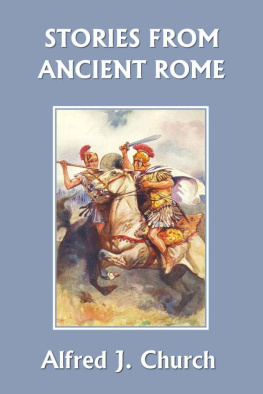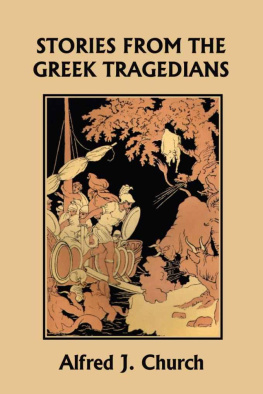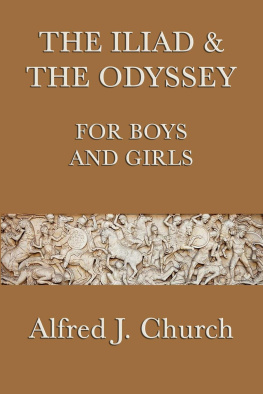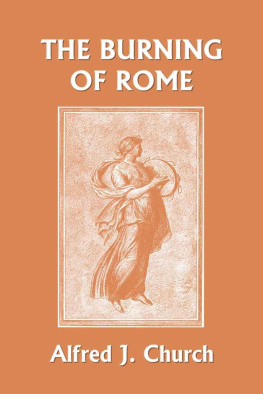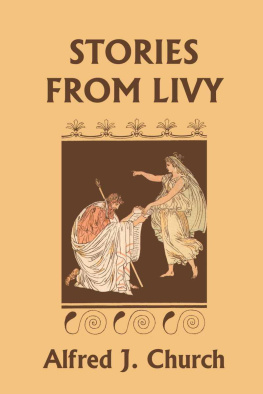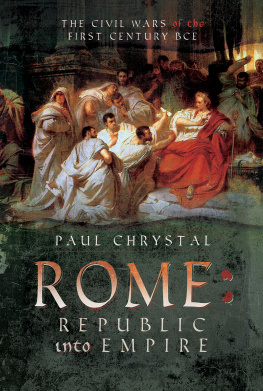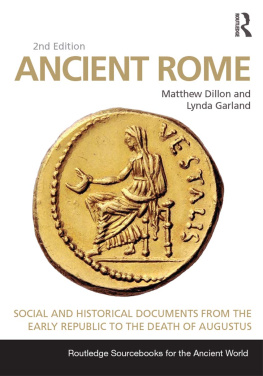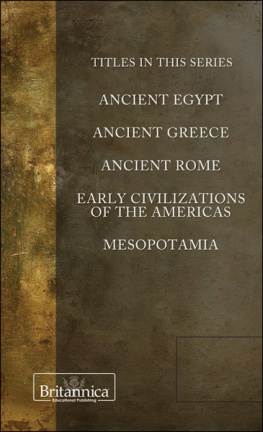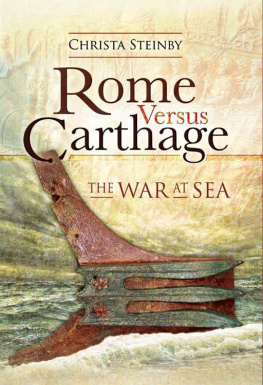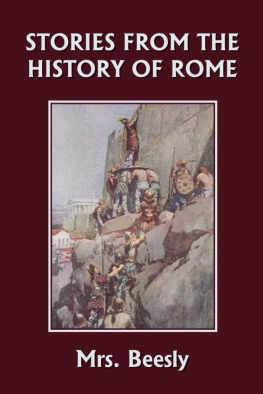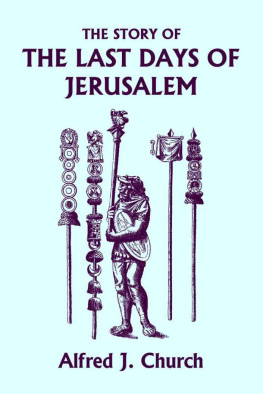Alfred J. Church - Stories from Ancient Rome
Here you can read online Alfred J. Church - Stories from Ancient Rome full text of the book (entire story) in english for free. Download pdf and epub, get meaning, cover and reviews about this ebook. year: 2007, publisher: Yesterdays Classics, genre: History. Description of the work, (preface) as well as reviews are available. Best literature library LitArk.com created for fans of good reading and offers a wide selection of genres:
Romance novel
Science fiction
Adventure
Detective
Science
History
Home and family
Prose
Art
Politics
Computer
Non-fiction
Religion
Business
Children
Humor
Choose a favorite category and find really read worthwhile books. Enjoy immersion in the world of imagination, feel the emotions of the characters or learn something new for yourself, make an fascinating discovery.
- Book:Stories from Ancient Rome
- Author:
- Publisher:Yesterdays Classics
- Genre:
- Year:2007
- Rating:4 / 5
- Favourites:Add to favourites
- Your mark:
- 80
- 1
- 2
- 3
- 4
- 5
Stories from Ancient Rome: summary, description and annotation
We offer to read an annotation, description, summary or preface (depends on what the author of the book "Stories from Ancient Rome" wrote himself). If you haven't found the necessary information about the book — write in the comments, we will try to find it.
Stories from Ancient Rome — read online for free the complete book (whole text) full work
Below is the text of the book, divided by pages. System saving the place of the last page read, allows you to conveniently read the book "Stories from Ancient Rome" online for free, without having to search again every time where you left off. Put a bookmark, and you can go to the page where you finished reading at any time.
Font size:
Interval:
Bookmark:
All rights reserved. No part of this book may be reproduced or retransmitted in any form or by any means without the written permission of the publisher.
This edition, first published in 2010 by Yesterday's Classics, an imprint of Yesterday's Classics, LLC, is an unabridged republication of the work originally published by Funk & Wagnalls Company in 1907. This title is available in a print edition (ISBN 978-1-59915-061-1).
Yesterday's Classics republishes classic books for children from the golden age of children's literature, the era from 1880 to 1920. Many of our titles are offered in high-quality paperback editions, with text cast in modern easy-to-read type for today's readers. The illustrations from the original volumes are included except in those few cases where the quality of the original images is too low to make their reproduction feasible. Unless specified otherwise, color illustrations in the original volumes are rendered in black and white in our print editions.
A BOUT the middle of the eighth century before Christ, there was founded in Italy a new town which was to become the most famous in the world. The site of Rome, for that was the name of the new foundation, was very well chosen. A number of hillsthey were reckoned as seven, though there were not so many separate heightslooked down upon a riverside meadow. The hills were steep enough to be easily defended, but not too steep to be built upon.
The river was navigable, and the distance from the sea was not so great as to cause inconvenience, but was enough to make the town safe from the attacks of pirates. The first settlers occupied two of the seven hills, one of the two being certainly the Palatine, the other probably the Quirinal. They seem to have been shepherds or herdsmen. So much we may gather from the oldest names, such, for instance, as that of one of the gates in the first city wall, Porta mugionis , "the gate of lowing."
One of the reasons which probably brought about the settlement at Rome was the fact that the country to the south was troubled by eruptions from a volcano. There is, it is true, no volcano now, but the lake of Alba, a town of which I shall soon have to speak, has evidently been at some time a crater. Some settlers may have been fugitives from neighbouring towns, men who had broken the laws and were flying from justice, or who had been driven out by civil strife.
Whoever the inhabitants of the new town may have been or wherever they may have come from, there very soon arose a difficulty which is felt in all young settlements, as in our own colonies in times past or even nowwhere were they to find wives? The chief of Rome sent envoys to the neighbouring towns, belonging to two peoples known as Latins and Sabines, and asked that the Roman townsfolk might be allowed to intermarry with them.
Rome was not, however, well liked among its neighbours. If its population was partly made up of people who had got into trouble at home, there was good reason why they should not be regarded with favour. At any rate the envoys were not well received, and their request was refused. The Romans then resolved to get by force what they could not persuade their neighbours to give them.
Romuluswho was their chiefproclaimed a great festival, to which, in the name of his people, he invited the inhabitants of the neighbouring towns, together with their wives and daughters. They came in great numbers.
While the guests were looking on at the games, which, as usual, were a part of the festival, the young men of Rome rushed in among them and carried off the unmarried women. The men, unprepared and unarmed as they were, could make no resistance. All that they were able to do was to make their own escape.
Of course the angry towns resolved to punish the Romans for this outrage; and if they had combined in an attack on the new State, they would very probably have conquered it. But they were too angry to wait. Even the three Latin towns which had suffered most did not act together. Separately they attacked the Roman territory, and separately they were beaten. One of them was glad to accept the terms which Romulus offered, and was united with Rome.
But when the great Sabine people, under its king, Titus Tatius, advanced to the attack, the danger became serious. The Romans did not venture to meet this powerful enemy in the field, but prepared to defend their walls. But the walls did not sufficiently protect them. The Sabines gained possession of the citadel, by the treachery of a woman, as the Romans declaredthey were always ready to account for anything that was not to their credit. However this may have been, the invaders certainly made their way into the city. There the fighting was furious.
At first the Sabines had the best of it, and the Romans fled. Romulus vowed to build a temple to Jupiter the Stayer, if the flight was stopped. His prayer was answeredso runs the storythe Romans turned fiercely upon their pursuers, and these in their turn fell back. Then came another change; the Sabines rallied, and the Romans could do little more than hold their own.

"IN A PAUSE OF THE BATTLE THE SABINE WOMEN RUSHED BETWEEN THE HOSTILE LINES."
In a pause of the battle the Sabine women rushed between the hostile lines, some of them carrying in their arms the children whom they had borne to their Roman husbands. They begged of their fathers and brothers on the one side and their husbands on the other, to cease from a strife from which, however it might end, they were bound to suffer. Their entreaties were heard. The battle was stopped; terms of peace were discussed, and in the end the two nations were made into one, under the joint rule of Romulus and Tatius.
Before long Tatius met his death in a private quarrel, and Romulus reigned alone for the rest of his life. His successor, Numa, a Sabine, it would seem, by birth, was a man of peace. His long reign of forty-one years was given to the ordering of religion and law. The two peoples which had been brought together in so strange a way were made into one harmonious whole.
Much might be said of the things that go to prove this union, but it will suffice to mention, as long as the Roman State lasted its citizens were wont to be called by the name of Quirites , the very name which the Sabine kings of old had used in addressing their subjects.
The reign of Tullus Hostilius, the warrior-king who succeeded the peaceful Numa, brought another accession to the State of Rome. Some twelve miles to the south stood the ancient city of Alba Longa. Between this city and Rome there was a close tie of kindred. Romulus was the grandson of an Alban king, the son of a princess who had been ill-treated by a usurping uncle, and some at least of his subjects in the new city which he had founded had been of Alban birth.
But kinship does not always mean friendship. The Jews, for instance, owned the relationship of nations for which they felt the bitterest hatred, Edom, Midian, Moab and Ammon. So it was with Alba and Rome. There were often border wars between the two States. Out of these was developed in course of time a serious struggle which could but end in the overthrow of one or the other.
Font size:
Interval:
Bookmark:
Similar books «Stories from Ancient Rome»
Look at similar books to Stories from Ancient Rome. We have selected literature similar in name and meaning in the hope of providing readers with more options to find new, interesting, not yet read works.
Discussion, reviews of the book Stories from Ancient Rome and just readers' own opinions. Leave your comments, write what you think about the work, its meaning or the main characters. Specify what exactly you liked and what you didn't like, and why you think so.

